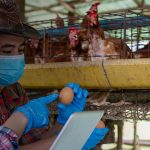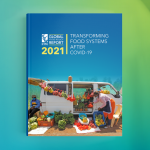COVID-19 has caused unprecedented disruptions affecting both the supply and demand for food. However, lessons from the pandemic provide an opportunity to lead to real structural change.
Transforming food systems after COVID-19: IFPRI Global Policy Food Report 2021
COVID-19 upended our food systems in 2020, leading to lost livelihoods, food insecurity, and rising poverty. IFPRI’s flagship report looks at the critical lessons learned and promising opportunities for transforming our food systems.
COVID-19: The virus will mostly spare young children; the economic crisis will not
As the COVID-19 pandemic continues to spread and persist, disrupting economies, food, health, and social protection systems, hard-won global progress on child nutrition and health are at risk. Marie Ruel and Derek Headey, writing on behalf of the Standing Together for Nutrition Research group, quantify the potential scale of child mortality and malnutrition impacts under […]
COVID-19 and resilience innovations in food supply chains
Food supply disruptions in developing countries during the COVID-19 pandemic have been varied and often severe, especially in labor-intensive segments of supply chains. Tom Reardon of Michigan State University and IFPRI’s Jo Swinnen summarize early experiences in both international and domestic supply chains across various types of firms and commodities. They review a range of […]
How to ensure effective government responses as COVID-19 spreads to rural areas
The COVID-19 pandemic has hit the global economy hard, and in many places other factors—such as the locust invasion in East Africa and falling export commodity prices—are compounding its effects. FAO Chief Economist Maximo Torero observes that no modern economy has experienced anything like the combination of the Great Lockdown and the worst recession since the […]
- 1
- 2
- 3
- 4
- Next Page »






